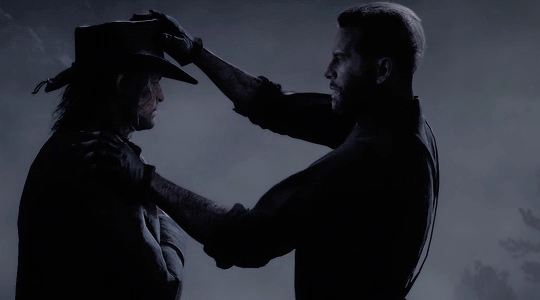Redemption arcs are satisfying. Watching a character at rock bottom slowly work their way back up onto a moral high ground, is one of the most entertaining character developments that can occur.
In a tragedy, redemption is few and far between. The story ends at rock bottom rather than giving the character a chance to recover. A prevalent way for this to occur is by death. Othello kills himself at the end of Othello, and Willy Loman kills himself at the end of The Death of a Salesman. Does death act as a punishment for the tragic hero, or as an absolution from their sins? Is it a redeeming act for these two characters, for example, to kill themselves after everything they’ve done? I think it’s none of these. Death simply acts as a way to provide defined closure to a character arc on a downturn, there is no open-ended nature to it - just a consequence of the tragic events in the story. It usually removes redemption as an option, which has no place in a traditional tragedy, depending on how it’s defined, but that doesn’t necessarily mean that redemption can’t be possible for certain tragic heroes.
A tragedy, according to Britannia, is a “branch of drama” that tackles the “terrible events encountered or caused by heroic individual”. Aristotle defined “moral ambiguity” as the true core of a tragedy, and Shakespeare loosely followed that train of thought in his Elizabethan tragedies. Othello is both somewhat understandable and reprehensible as his actions drive his downfall and bring other characters down with him - and this stands precisely true for our perception of Willy Loman in modern tragedy. We feel bad for these characters, but cannot admit that it isn’t their fault. Both are tragic heroes with fatal flaws in a plot-driven story that grants some knowledge to the audience (a lesson). Tragedy is impactful to the audience by ending at the lowest of lows, and death is one of the best ways for that to occur. Can redemption even truly fit in here?
Redemption is the “act, process, or instance of serving to offset or compensate for a defect” (Merriam-Webster). In terms of character development, it serves as a way for a character to make amends for past mistakes or wrongdoings and become more virtuous, perhaps through some heroic acts. It appears that on the surface, redemption can certainly occur in a tragic story. A character with a reprehensible fatal flaw that ends up being his wrongdoing, is still likable, pitied, and rooted for - it's not out of the question for a character to turn it around - unless they die of course.
dead
In fact, death is a way for tragedies to completely remove redemption as a possibility, marking the finality of a character. It’s hard to imagine that Othello would keep being so gullible, and not want to make amends with those he hurt, like Cassio, after he realized he was manipulated into hurting himself and others. But since he dies, that is not up to speculation. So to find redemption in a tragedy, we may have to remove death as a factor.
Liang mentions how, unlike Shakespearean tragedies, Classical Chinese tragedies end differently. “Shakespeare usually depicts a noble person's final calamity resulting from his own defect in personality; most of the heroes in classical Chinese tragedies are common people with a perfect moral quality, who suffer a lot to defend justice and end up with a good result”. In fact they seem fundamentally very different, besides the suffering. In fact no matter how twisted or unique the word “tragedy” may get, suffering to invoke pity or any strong reaction from the audience seems to be. common along cultural and time barriers. The problem is that the “perfect moral quality” removes redemption as an option too. In this tragedy, the characters are already good, there is nothing to redeem. Unfortunately removing death does not completely guarantee the possibility of redemption.
There is no room for redemption in a tragic story as defined by certain classical writers and authors. Still, in present popular culture, it is easier to find a character that fits the strain of a “tragic hero” yet still finds a sort of redemption that goes against that traditional idea of a tragedy. Common examples of redemption that people consider in modern pop culture include characters like Darth Vader, Arthur Morgan, or Prince Zuko.
SPOILERS FOR EACH OF THE ABOVE CHARACTERS AHEAD!!!
Anakin Skywalker’s turn to the dark side is tragic. Manipulated to hate those who raised him, accidentally killing his loved one, being forced to fight his master and best friend who defeated and mutilated him: all of this resulted in him becoming the iconic villain clad in black armor. In fact, the entire prequel trilogy of Star Wars has the makings of a tragedy: The Jedi Order’s ignorance and arrogance allowed for their downfall and the very soldiers and friends they fought alongside for years turned on them inexplicably, killing almost all of them. However, the lack of death for a few of the main characters prevents this story from ending (or the fact that the original trilogy already existed). Unlike how Othello or Willy died at the end of the tragedy, Anakin, his newborn children, Obi-wan, Yoda, and more are all still alive. There is still the possibility for redemption for Vader and for the world. I mean, Episode IV is quite literally called “A New Hope." Although in the end Vaser isn’t redeemed in the eyes of the world, still technically a mass murderer. He is redeemed in the eyes of his son, saving him and many more with just one act.
Tragic heroes like Vader are perfect for redemption arcs, because they have shown some redeeming qualities, have been good before, or have foreshadowed their better side in some way. If Shakespeare decided to add a redemption arc, it would be for Othello, not for Iago, who is a pure villain who has shown no good - in which case a redemption would be somewhat unsatisfying.
In Avatar: The Last Airbender, Zuko’s redemption is seen from a mile away. He is introduced as a villain with honor, only trailing the Avatar to capture him and restore his standing with the Fire Nation, who banished him. Throughout his journey he takes refuge within the people who feel the oppression of his very nation he seeks to rejoin, and has his views shaken. His well-mannered uncle accompanies him and also influences his evolution. As a character, he is paralleled with Aang, the main character, and overall a change in heart is foreshadowed. Not every character is fit for a redemption arc. If Zuko stayed by his father, the leader of the nation, he would have ended up like his sister - cold-blooded, and psychopathic. However, the combination of certain personality traits and the right experiences and influences changed him for the better. Othello had positive qualities that were highlighted early on, but someone like Iago, a pure villain like Fire Lord Ozai, has no real place for redemption as the story stands. For redemption to be satisfying, it must make sense, and tragic heroes tend to have “good” qualities besides their fatal flaws that they can cling to, to restore themselves. Redemption is easily a possibility from a character development standpoint for tragic characters.
the better.... sounds like redemption to me.
However, Avatar is not a tragedy. Zuko doesn’t die at the end of this story. And although Vader dies and his initial downfall is tragic, his later actions completely save the galaxy and are hard to describe as tragic. They are simply characters with tragic backstories or lives that went down the wrong path and redeemed themselves, which feels like a step down from what we are looking for.
Maybe we can find the story we are looking for in a unique narrative piece of media - a video game. In Red Dead Redemption 2 (yes it's literally in the name), Arthur Morgan is an outlaw and a member of the Van der Linde gang during the decline of the Wild West era. Participating in many crimes and death, he was not a good man, but he was honest. After contracting tuberculosis, he was given a deadline for his life, which was a catalyst for change, even though doubts about his way of life and allegiances were being questioned constantly. Through the narrative vessel of a video game, the player has the option to keep Arthur as someone cold and aggressive - dying brutally - or as someone empathetic and selfless - dying peacefully after helping his friend’s family escape the gang’s downfall. No matter how you look at it, the story is tragic in almost every way. Arthur is a member of the gang, and they are the reason for their own downfall. However, he can slowly redeem himself as he helps the community and understands the way to truly live, as he slowly dies. A tragic hero dies a tragic death as his friends lose trust in him and he has to find what’s important in the world. This is, in my eyes, a tragedy with death and redemption. It has it all. Would someone like Shakespeare consider this to be a tragedy?
.....................
Liang, Junqing. "On Tragic Heroes: A Comparative Study of Hamlet and the Orphan of Chao." Theory and Practice in Language Studies, vol. 5, no. 10, Oct. 2015, p. 2076+. Gale Literature Resource Center, link.gale.com/apps/doc/A446734731/LitRC?u=lom_macombtgps&sid=bookmark-LitRC&xid=10e3a0cd. Accessed 21 Dec. 2023.
"Redemption." Merriam-Webster.com Dictionary, Merriam-Webster, https://www.merriam-webster.com/dictionary/redemption. Accessed 10 Jan. 2024.
Sewall, Richard B. and Conversi, Leonard W.. "tragedy." Encyclopedia Britannica, 20 Nov. 2023, https://www.britannica.com/art/tragedy-literature. Accessed 20 December 2023.










No comments:
Post a Comment